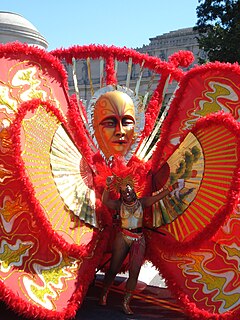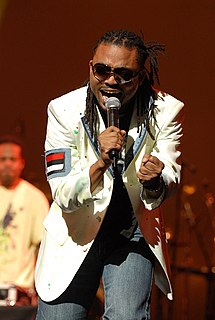Soca music is a genre of music defined by Lord Shorty, its inventor, as the "Soul of Calypso", which has influences of African and East Indian rhythms. It was originally spelt "sokah" by its inventor but through an error in a local newspaper when reporting on the new music it was erroneously spelt "soca"; Lord Shorty confirmed the error but chose to leave it that way to avoid confusion. It is a genre of music that originated in Trinidad and Tobago in the early 1970s and developed into a range of styles during the 1980s and after. Soca was initially developed by Lord Shorty in an effort to revive traditional calypso, the popularity of which had been flagging amongst younger generations in Trinidad due to the rise in popularity of reggae from Jamaica and soul and funk from the US. Soca is an offshoot of kaiso/calypso, with influences from East Indian rhythms and hooks.
The music of Trinidad and Tobago is best known for its calypso music, soca music, chutney music, and steelpan. Calypso's internationally noted performances in the 1950s from native artists such as Lord Melody, Lord Kitchener and Mighty Sparrow. The art form was most popularised at that time by Harry Belafonte. Along with folk songs and African- and Indian-based classical forms, cross-cultural interactions have produced other indigenous forms of music including soca, rapso, parang, chutney, and other derivative and fusion styles. There are also local communities which practice and experiment with international classical and pop music, often fusing them with local steelpan instruments.

The steelpan is a musical instrument originating in Trinidad and Tobago. Steelpan musicians are called pannists.
The music of the Lesser Antilles encompasses the music of this chain of small islands making up the eastern and southern portion of the West Indies. Lesser Antillean music is part of the broader category of Caribbean music; much of the folk and popular music is also a part of the Afro-American musical complex, being a mixture of African, European and indigenous American elements. The Lesser Antilles' musical cultures are largely based on the music of African slaves brought by European traders and colonizers. The African musical elements are a hybrid of instruments and styles from numerous West African tribes, while the European slaveholders added their own musics into the mix, as did immigrants from India. In many ways, the Lesser Antilles can be musically divided based on which nation colonized them.

The Toronto Caribbean Carnival, formerly known as Caribana, is a festival of Caribbean culture and traditions held each summer in the city of Toronto, Ontario, Canada. It is a pan-Caribbean Carnival event and has been billed as North America's largest street festival, frequented by over 1.3 million visitors each year for the festival's final parade and an overall attendance of 2 million.

The music of Saint Kitts and Nevis is known for a number of musical celebrations including Carnival. The last week in June features the St Kitts Music Festival, while the week-long Culturama on Nevis lasts from the end of July into early August.
The music of Antigua and Barbuda is largely African in character, and has only felt a limited influence from European styles due to the population of Antigua and Barbuda descending mostly from West Africans who were made slaves by Europeans.

The Trinidad and Tobago Carnival is an annual event held on the Monday and Tuesday before Ash Wednesday in Trinidad and Tobago. This event is well known for participants' colorful costumes and exuberant celebrations. There are numerous cultural events such as "band launch fetes" running in the lead up to the street parade on Carnival Monday and Tuesday. It is said that if the islanders are not celebrating it, then they are preparing for it, while reminiscing about the past year's festival. Traditionally, the festival is associated with calypso music, with its origins formulated in the midst of hardship for enslaved West and Central Africans; however, recently Soca music has replaced calypso as the most celebrated type of music. Costumes, stick-fighting and limbo competitions are also important components of the festival.
The Canboulay riots were a series of disturbances in the British colony of Trinidad and Tobago in 1881. The riots came about in response to efforts by the colonial police to restrict aspects of the island's annual Carnival festival. In Port of Spain, San Fernando and Princes Town, angered Trinidadians rioted in response to the actions of the police; several people were killed as a result of the riots. Canboulay music forms an important part the musical traditions of Trinidad and Tobago, including the usage of steelpans, which were outlawed by the colonial police in the 1880s. The "chantwell" or chantuelle who was also an integral part of the celebrations was the forerunner of the calypsonian and later soca music.

The culture of Dominica is formed by the inhabitants of the Commonwealth of Dominica. Dominica is home to a wide range of people. Although it was historically occupied by several native tribes, the Taíno and Island Caribs (Kalinago) tribes remained by the time European settlers reached the island. "Massacre" is a name of a river dedicated to the murders of the native villagers by French and British settlers, because the river ran red with blood for days. Each claimed the island and imported slaves from Africa. The remaining Caribs now live on a 3,700-acre (15 km2) Carib Territory on the east coast of the island. They elect their own chief.

The West Indian Day Parade Carnival is an annual celebration of West Indian culture, held annually on around the first Monday of September in Crown Heights, Brooklyn, New York City. It is organized by the West Indian American Day Carnival Association (WIADCA).

The Antiguan Carnival is a celebration of the emancipation of slavery in the country held annually from the end of July to the first Tuesday in August. The most important day is that of the j'ouvert, in which brass and steel bands perform for much of the island's population. Barbuda's Carnival, held in June, is known as Caribana. The Antiguan and Barbudan Carnivals replaced the Old Time Christmas Festival in 1957, with hopes of inspiring tourism in Antigua and Barbuda. Some elements of the Christmas Festival remain in the modern Carnival celebrations.
Chanté mas and Lapo kabrit is a form of Carnival music of Dominica. It is performed by masquerading partygoers in a two-day parade, with a lead vocalist (chantwèl), who is followed by the responsorial chorus (lavwa), with drummers and dancers dancing backwards in front of the drummer on a tambou lélé. The Carnival has African and French roots and is otherwise known as Mas Dominik, the most original Carnival in the Caribbean.

A moko jumbie is a stilts walker or dancer. "Moko" means healer in Central Africa and "jumbi", a West Indian term for a ghost or spirit that may have been derived from the Kongo language word zumbi. The Moko Jumbies are thought to originate from West African tradition brought to the Caribbean.

Machel Montano is a Trinidadian soca singer, actor, record producer and songwriter. Known for his high energy, fast-paced, and often unpredictable on-stage performances, he is one of the genre’s most popular artists in the world.

Sterling Betancourt MBE, FRSA is a Trinidad-born pioneer, arranger and musician on the steelpan, a major figure in pioneering the Pan in Europe and the UK (1951).
Selwyn Baptiste was a Trinidad and Tobago-born pioneer of the introduction of the steel drum into Britain, forming the country's second steel band in 1967, and early organizer of London's Notting Hill Carnival. An educator as well as a pannist, a percussionist and drummer, he is credited with bringing about the teaching of steelpan playing throughout the UK.

Gerald Achee was known by his stage name Gerry Drums, was a Trinidadian drummer and the leader of the Village Drums of Freedom.
Anthony Francis, known by his stage name Sanga of The Valley, is a Trinidadian drummer, Babatunde Olatunji' s student, member of the Village Drums of Freedom.











